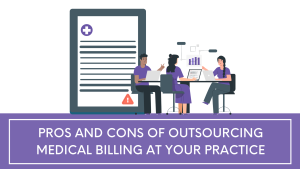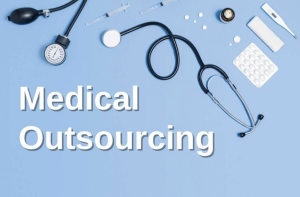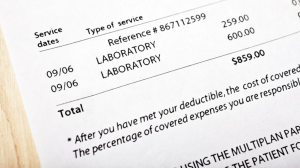The Pros and Cons of Outsourcing Medical Billing Services

Introduction
Are you considering outsourcing your medical billing services? Whether you run a large medical practice or a small clinic, outsourcing can be an attractive option. Before making a decision, it’s important to weigh the pros and cons.
Overview of outsourcing medical billing services
Outsourcing medical billing services involves hiring a third-party company to handle medical billing and coding. This can save you time and money, as well as reduce the chance of errors. You won’t have to worry about hiring and training in-house staff or keeping up with changing regulations.
Objective of the article
The objective of this article is to give you an understanding of both the advantages and disadvantages of outsourcing medical billing services. By the end of the article, you will be better equipped to make an informed decision about your medical billing needs.
Pros of outsourcing medical billing services
Some of the advantages of outsourcing medical billing services include:
- Increased efficiency and reduced errors
- Greater focus on patients and medical issues
- Cost savings on staff and software
- Access to expert billing professionals
Cons of outsourcing medical billing services
Some of the disadvantages of outsourcing medical billing services include:
- Loss of control over billing processes
- Potential for communication issues with the third-party company
- Additional costs if the outsourcing company is not transparent about fees
- Concerns about data security and confidentiality
Now that you have a better understanding of the pros and cons of outsourcing medical billing services, you can make an informed decision about what works best for your medical practice.

Pros of Outsourcing Medical Billing Services
When it comes to medical billing services, outsourcing can be a great solution for healthcare practices. Here are some of the benefits of outsourcing this task to experts:
Access to Experts
Outsourcing your medical billing will give you access to experts who have the experience and knowledge needed to accurately process claims and handle billing tasks. This can help reduce errors and improve your billing process.
Cost-effectiveness
Outsourcing medical billing can be a cost-effective option for healthcare practices. By outsourcing, you can avoid the costs of hiring and training in-house billing staff, purchasing expensive billing software, and maintaining an in-house billing system.
Improved Efficiency and Accuracy
Outsourcing medical billing can improve the efficiency and accuracy of your billing process. Professional billing companies use automated tools and systems that can reduce the time it takes to process claims and eliminate errors.
By weighing the pros and cons of outsourcing your medical billing services, you can make an informed decision that will benefit your healthcare practice.
The Pros and Cons of Outsourcing Medical Billing Services

Cons of Outsourcing Medical Billing Services
Outsourcing medical billing services can have its drawbacks. Here are some things to consider:
Lack of Control
Outsourcing means you have to entrust a third party with financial transactions and valuable data. You may not have full control over this information, which could lead to mistakes or miscommunications.
Security Risks
With outsourcing, there is always the risk of cyber attacks and data breaches. Providers may have less secure systems than your own in-house team, putting your sensitive information in danger.
Communication Challenges
Outsourcing can also lead to communication errors. Communicating with an outsourced team, especially if they are in a different time zone, can be difficult. This could lead to significant delays in getting information and errors in billing and coding.
When considering outsourcing, it is essential to weigh the pros and cons carefully. While it could lead to cost-savings and other benefits, you must ensure that you are making the right decision for your practice.

Factors to consider before outsourcing medical billing services
Outsourcing medical billing services can have both pros and cons. Before making a decision, there are a few factors to consider:
Company size
The size of your medical practice can determine whether or not outsourcing is a viable option. Smaller practices may find it more cost-effective to outsource their billing services to a third-party company. On the other hand, larger practices may benefit from keeping their billing in-house.
Budget allocation
Outsourcing medical billing services can come with a price tag. You must consider whether or not your budget can handle the cost of outsourcing. It’s important to compare the cost of outsourcing with the potential cost savings and revenue increases that outsourcing may bring.
Internal expertise
If your practice has billing experts on staff, outsourcing may not be necessary. However, if your expertise is limited in medical billing, outsourcing can bring the expertise you need without hiring additional staff.
Remember to carefully consider these factors before making a decision regarding outsourcing medical billing services. It may be a great way to increase efficiency and save money, but it’s important to assess all factors before taking the plunge.

Types of Outsourcing Options for Medical Billing Services
When considering outsourcing medical billing services, it’s important to understand the types of outsourcing options available. These include offshore outsourcing, onshore outsourcing, and nearshore outsourcing.
Offshore Outsourcing
Offshore outsourcing involves hiring a third-party company in a different country to handle your medical billing. This option can be cost-effective as labor rates may be lower in other countries. However, there may be language barriers and differences in time zones that can lead to communication issues.
Onshore Outsourcing
Onshore outsourcing involves hiring a third-party company within your own country to handle your medical billing. This option can provide better communication and fewer language barriers. However, the cost may be higher than offshore outsourcing.
Nearshore Outsourcing
Nearshore outsourcing involves hiring a third-party company in a neighboring country to handle your medical billing. This option can provide a balance between cost savings and communication issues. Time zones may also be more aligned, leading to less communication issues.
When deciding which outsourcing option to choose, it’s important to weigh the benefits and drawbacks of each option and choose the one that best fits your medical billing needs.
How to Choose the Right Outsourcing Company for Medical Billing Services
If you’re considering outsourcing your medical billing services, choosing the right outsourcing company is crucial for the success of your practice. Here are some key factors to consider when selecting an outsourcing partner.
Experience and Expertise
Hiring an experienced and knowledgeable outsourcing company is essential. You want a team that specializes in medical billing, understands the ever-changing insurance landscape, and can stay up-to-date with the latest regulations and requirements.
Cost and Pricing Structure
Outsourcing your medical billing can save you money, and you want to make sure you find a company with transparent pricing. Make sure you fully understand how the outsourcer charges for their services and what services are included in their fee.
Security Protocols
Medical billing involves sensitive patient information, so you want to make sure the outsourcing company has robust security protocols in place. Find out how they protect data, secure their network, and ensure compliance with HIPAA regulations.
Remember, outsourcing medical billing services can offer significant benefits but choosing the right outsourcing company is vital. Do your due diligence and ask the right questions before making a decision.
Potential Impact of Outsourcing Medical Billing Services on Healthcare Providers
Outsourcing medical billing services has seen increased adoption in recent years, with more healthcare providers choosing to transfer their billing processes to external service providers. You may be wondering whether outsourcing medical billing services is the right choice for your practice. Here are some factors to consider:
Increased Revenue and Cash Flow
One of the biggest advantages of outsourcing medical billing services is the potential for increased revenue and cash flow. External billing companies specialize in billing and coding, which means they have the expertise to help you optimize your billing process and improve your collections. This can help your practice get paid faster and more consistently.
Improved Patient Satisfaction
Outsourcing medical billing services can also help improve patient satisfaction. By outsourcing billing, you can reduce the time and resources you spend on billing and devote more attention to patient care. This can help improve the patient experience and increase patient loyalty.
Organizational Changes
Outsourcing medical billing services requires some organizational changes. You will need to work with your billing partner to ensure a smooth transition and to establish effective communication channels. You also need to ensure that your billing partner is compliant with regulations and laws governing healthcare billing.
In summary, outsourcing medical billing services can help increase revenue, improve patient satisfaction, and reduce the burden of billing. However, it requires careful consideration of organizational changes and partner selection.
Resources
If you’re considering outsourcing your medical billing services, it’s important to weigh the pros and cons before making a decision. By outsourcing, you can save time and money, and potentially enhance the quality of your billing services. However, there are also potential disadvantages to consider.
List of Outsourcing Companies
There are numerous outsourcing companies that specialize in medical billing services. Some popular options include:
- Kareo
- Practice Management
- AthenaHealth
- Brightree
- AdvancedMD
It’s important to thoroughly research each company to determine their reputation, experience, and pricing. You should also consider factors such as their level of customer support and the technology they use to optimize billing processes.
Articles and Research Studies
There are countless articles and research studies available on the advantages and disadvantages of outsourcing medical billing services. These resources provide valuable insights on cost savings, efficiency, and quality control. Some notable studies include:
- “Outsourcing medical billing: strengths, weaknesses, and tradeoffs” by Jacklyn Isenegger and Earl Ewing.
- “The benefits and risks of outsourcing medical billing” by Carol Peckham.
Before making a decision, it’s important to conduct thorough research and consider all factors in order to determine whether outsourcing is the right choice for your organization.














